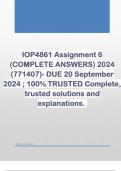IOP4861 Assignment 6
(COMPLETE ANSWERS) 2024
(771407)- DUE 20 September
2024 ; 100% TRUSTED Complete,
trusted solutions and
explanations.
[Pick the date]
, Questions 1 to 5 are based on scenario A: (15marks) Scenario A: Expert
Bank is an insurance company and a financial credit provider. Every three
years, Expert Bank selects 10 people for their graduate program. These
prospective graduates are selected, based on their ability to learn new
material quickly and efficiently. Specific personality traits relevant to the work
profile (required from graduates) include that they are emotionally stable (well-
adjusted, calm, and resilient), independent-minded (self-determined and
assertive) as well as exhibit high levels of self-control. The bank is very
attentive to equitable selection practices in the South African work context and
does not want to discriminate based on differences in educational and/or
socio-economic background. Expert Bank wants to use one (1) cognitive
instrument and one (1) personality instrument to select graduates, but they
are not sure which is best. They are considering the Learning Potential
Computerised Adaptive Test (LPCAT), The Wechsler Adult Intelligence Scale
(WAIS-III), the online version of the Fifteen Factor Questionnaire Plus
(15FQ+), and the Myers-Briggs Type Indicator (MBTI). They approached you
for advice.
1. Discuss the nature of each of the cognitive and personality instruments
proposed in the scenario. (4 marks)
1. Cognitive Instruments:
These tools assess mental capabilities, such as reasoning, memory, problem-solving, and
learning ability. They are commonly used in educational, clinical, and occupational settings to
gauge intellectual potential and cognitive functioning.
Examples:
o Intelligence tests (IQ tests): Measure general intellectual ability, including verbal
and non-verbal reasoning, logical thinking, and comprehension.
o Aptitude tests: Evaluate specific cognitive skills, such as numerical, verbal, or
spatial reasoning, often linked to potential for success in particular tasks or fields.
o Memory assessments: Focus on evaluating short-term and long-term memory
capacities and recall abilities.
Cognitive tests are generally objective and yield quantitative results that can be compared against
normative data.
2. Personality Instruments:
, These tools assess an individual’s typical patterns of thinking, feeling, and behaving, which
make up their personality traits. Personality instruments are often used in counseling, career
guidance, and clinical assessments to understand behavior and motivations.
Examples:
o Self-report personality inventories: Such as the Big Five Inventory (BFI) or
Minnesota Multiphasic Personality Inventory (MMPI), which measure traits
like openness, conscientiousness, extraversion, agreeableness, and neuroticism.
o Projective tests: Such as the Rorschach Inkblot Test or Thematic
Apperception Test (TAT), where individuals respond to ambiguous stimuli,
revealing hidden emotions and internal conflicts.
Personality tests are often subjective and qualitative, focusing on behavioral tendencies rather
than capabilities.
The nature of these instruments varies in purpose, method, and interpretation. Cognitive
instruments are more standardized, often used for diagnostic or predictive purposes, while
personality instruments aim to explore individual differences and offer insights into behavior.
Both types of instruments complement each other in providing a fuller understanding of an
individual's abilities and character.
2. Recommend the most appropriate uses for each of the proposed
instruments in the South African work context. (4 marks)
In the South African work context, where diversity, equity, and skills development are key
considerations, the most appropriate uses for cognitive and personality instruments can be
aligned with specific goals in recruitment, employee development, and organizational
effectiveness.
1. Cognitive Instruments:
Cognitive assessments are highly effective for determining candidates' ability to perform job
tasks that require problem-solving, logical reasoning, and learning new skills. In the South
African work context, these tools can be useful in:
Recruitment and Selection:
o Cognitive tests can help organizations objectively evaluate a candidate’s potential
for success in cognitively demanding roles such as management, finance,
engineering, or IT. They are useful in screening applicants for job roles where
complex problem-solving or quick decision-making is essential.
Training and Development:
o Cognitive assessments can identify areas where employees may need further
training or support. For example, aptitude tests can highlight skills gaps, helping




